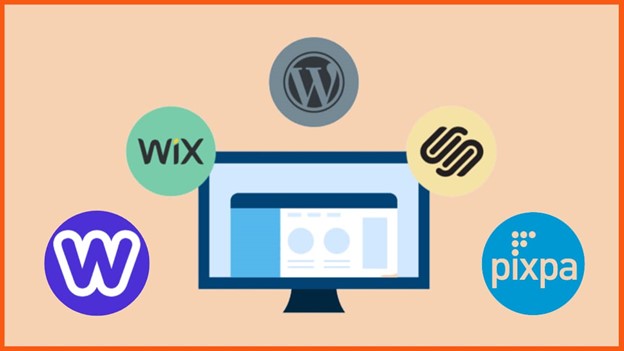Having a professional website is crucial for businesses of all sizes. It serves as a digital storefront, giving potential customers a first impression of your brand. A well-designed and user-friendly website can help build credibility, establish trust, and attract new customers. It also provides a platform for showcasing your products or services, sharing valuable content, and engaging with your audience.
With so many web builders available, choosing the right one for your business is important. The best web builder for you will depend on your specific needs, budget, and technical skills. By taking the time to research and compare different options, you can find a web builder that meets your requirements and helps you create a professional and effective website.
Tip 1: Define Your Website Needs
Identifying the purpose of your website
Before you start looking for a web builder, it’s important to clearly define the purpose of your website. Are you looking to sell products online, showcase your portfolio, or provide information about your services? Understanding the primary goal of your website will help you choose a web builder that offers the right features and functionalities.
Determining the features and functionalities required
Once you’ve identified the purpose of your website, you can start thinking about the specific features and functionalities you’ll need. For example, if you’re planning to sell products online, you’ll need an e-commerce platform with shopping cart functionality. If you want to showcase your portfolio, you’ll need a web builder with a range of design options and image galleries. Make a list of the features and functionalities that are essential for your website, as well as any additional features that would be nice to have.
Understanding your target audience and their preferences
it’s important to consider your target audience and their preferences when choosing a web builder. Think about the demographics of your audience, as well as their browsing habits and device preferences. For example, if your audience is primarily mobile users, you’ll want to choose a web builder that offers mobile-responsive design options. If your audience is tech-savvy, you may want a web builder with more advanced customization options. By understanding your audience, you can choose a web builder that will help you create a website that resonates with your target market.
Tip 2: Research and Compare Web Builders
Exploring different web builder options
When researching web builders, it’s important to explore a variety of options to find the one that best fits your needs. Some popular web builders include Wix, Squarespace, WordPress, Shopify, and Weebly. Each of these platforms offers different features, pricing plans, and customization options. Take the time to explore each platform’s website, read reviews, and watch tutorials to get a sense of what each platform offers.
Reading reviews and testimonials from other users
One of the best ways to gauge the quality of a web builder is to read reviews and testimonials from other users. Look for reviews on third-party websites, as well as testimonials on the web builder’s own website. Pay attention to what users have to say about the platform’s ease of use, customer support, and overall satisfaction. Keep in mind that no platform is perfect, so it’s important to weigh the pros and cons of each option.
Comparing features, pricing, and customer support
When comparing web builders, it’s important to consider a variety of factors, including features, pricing, and customer support. Look for a platform that offers the features and functionalities you need, such as e-commerce capabilities, blogging tools, and design options. Consider the pricing plans and whether they fit within your budget. Finally, evaluate the quality of the platform’s customer support, including the availability of live chat, phone support, and online resources.
Tip 3: Consider Your Budget and Resources
Setting a realistic budget for your website
Before choosing a web builder, it’s important to set a realistic budget for your website. Consider the cost of the web builder itself, as well as any additional expenses, such as domain registration, hosting, and third-party integrations. Be sure to factor in ongoing costs, such as monthly or annual subscription fees, as well as any potential future expenses, such as upgrades or add-ons.
Evaluating the cost of different web builder plans
Most web builders offer a range of pricing plans, from basic free plans to premium plans with advanced features. Evaluate the cost of each plan and consider which features are essential for your website. Keep in mind that some platforms may offer discounts for annual subscriptions or special promotions, so be sure to check for any available deals.
Assessing your team’s technical skills and available resources
consider your team’s technical skills and available resources when choosing a web builder. Some platforms are more user-friendly and require less technical expertise, while others may be more complex and require more advanced skills. Consider whether you have the necessary skills in-house or if you’ll need to hire outside help. Additionally, consider the time and effort required to set up and maintain your website, as well as any ongoing support or training that may be needed.
Tip 4: Look for Customization and Scalability
Assessing the level of customization offered by web builders
When choosing a web builder, consider the level of customization it offers. Some provide a wide range of templates and design options, allowing you to create a unique website. Others may have more limited customization options. Choose a web builder that offers the right balance of flexibility and ease of use.
Considering the scalability of the platform for future growth
Scalability is important as your business grows. Look for a web builder that can easily scale with your business, allowing you to add new features or expand your website. Some offer built-in scalability features, while others may require you to upgrade to access advanced features.
Ensuring compatibility with third-party integrations and tools
Consider the compatibility of the web builder with third-party integrations and tools. Many businesses rely on various tools and services, such as email marketing platforms or analytics tools. Look for a web builder that integrates seamlessly with the tools you use or offers built-in integrations with popular third-party services.
Tip 5: Prioritize User Experience and SEO
Evaluating the user-friendliness of the web builder interface
User experience (UX) is a critical factor in the success of your website. Look for a web builder that offers a drag-and-drop interface, pre-designed templates, and other features that make it easy to create a professional-looking website without any coding or design experience.
Ensuring the website is optimized for search engines
When choosing a web builder, look for built-in SEO features that make it easy to optimize your website for search engines. This may include features such as customizable meta tags, image alt text, and XML sitemap generation. Some web builders also offer SEO tools and analytics to help you track your website’s performance and make improvements over time.
Checking for mobile responsiveness and fast loading times
Mobile responsiveness and fast loading times are important. Choose a web builder with mobile-responsive design options and tools to optimize your website’s performance. This ensures your website is accessible and enjoyable to use on any device.
Wrapping up
Choosing the right web builder is an important decision that can significantly impact the success of your website and your business. Take the time to research and compare different options and consider factors such as customization, scalability, user experience, and SEO. By making an informed decision, you can create a professional and effective website that helps you achieve your goals.


